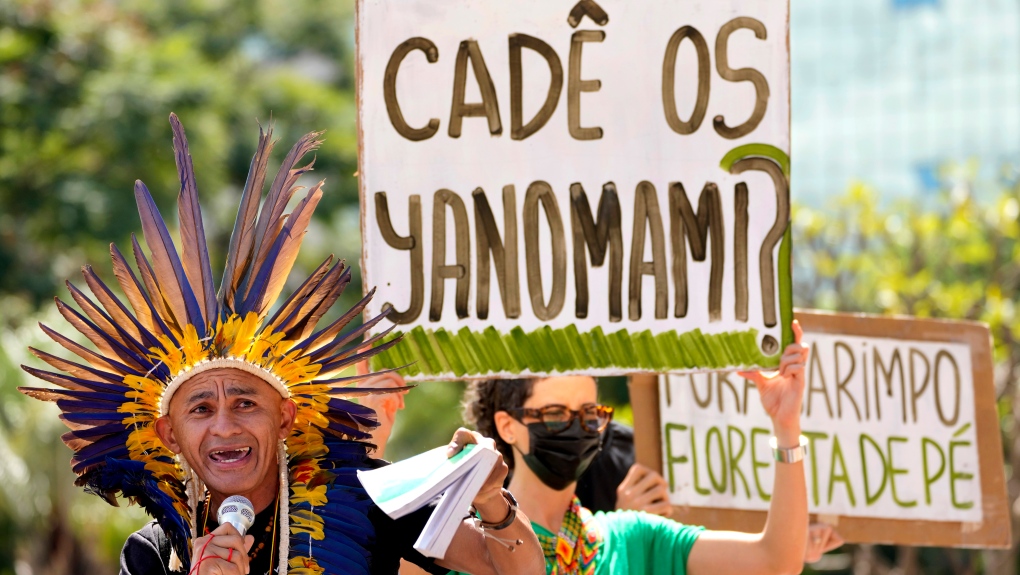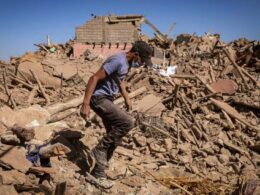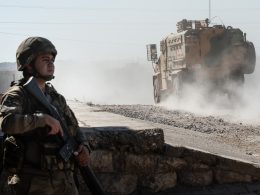By Ana Vitória and Pedro Meade
The Indigenous Territory (IT) of the Yanomami has been turned into a battle ground. The consequences of the genocidal policies of the Bolsonaro misgovernment have been devastating, placing the Yanomami in a situation of extreme violence, poverty and calamity, leading to the death of women, the elderly and children. Bolsonarism dismantled any and all policies to protect the territory, the environment and the health of these peoples, promoting and opening up space for illegal mining in the region, creating the barbarism that we see in the Yanomami Indigenous Territory today. According to the Ministry of Indigenous Peoples, “570 Yanomami children died from mercury contamination and starvation.” But Bolsonaro is just a symptom of a system that depends on division and violence to maintain itself.
The scale of the barbarity was revealed in the first weeks of Lula’s new government, after a photo was circulated on social media of a Yanomami woman who died from malnutrition and malaria. More and more photos and reports came out showing that the situation was even worse than the whole country believed. This led the minister for indigenous peoples, Sônia Guajajara and Lula to visit the site and a state of emergency was declared by the federal government. The minister of indigenous peoples says “the situation of the Yanomami people is not new… every 72 hours, a Yanomami child or elderly person dies from malnutrition, diarrhoea and malaria.”
The health and humanitarian crisis that the Yanomami people are experiencing today was intensified by former president Jair Bolsonaro who has proven himself to be an enemy of the indigenous peoples during his four years in office. Indigenous leader Junior Hekurari, president of the Yanomami Indigenous Health District Council, said “that the Bolsonaro government spent four years ignoring the requests for help from the indigenous communities in the region.” He also said that “more than 60 requests for aid have been sent to the Bolsonaro government and all have been ignored.”
Bolsonaro encouraged the illegal miners
Bolsonaro in his racist speeches against indigenous people has encouraged miners to invade territories that are demarcated and, in theory, protected. The Yanomami were among the most affected, but in addition to them, the Kayapós and Munduruku are also suffering from this problem, as well as other peoples. The former president attacked the indigenous peoples by denying them the demarcation of their territories, the right to health and, with his allies in congress, tried to introduce bills that would allow mining in indigenous areas even if his efforts were not approved in parliament.
They promoted attacks that stimulated destruction in the Amazon leading to deforestation, fires and contamination of rivers. During the period of the Bolsonaro government, together with business owners and their companies, no effort was spared to ensure the extermination of the Yanomami people so that they could lay their hands on the land and exploit it.
As has already been said, the invasions of indigenous land are nothing new. The Yanomami have been fighting for many years, since before their land was demarcated in 1992. In the 1940s, these peoples had contact with invaders when the Brazilian government wanted to mark out the border with Venezuela. In the 1970s, the military dictatorship decided to build a road cutting through two indigenous communities and this had a direct impact on the Yanomami and led to the disappearance of two villages. To this day these communities feel the effects.
Gold rushes have existed for decades
The gold rush leading to this current genocide has been going on for decades. According to Survival Brasil: ‘During the 1980s, the Yanomami suffered tremendously when some 40,000 Brazilian miners invaded their land. The miners shot at them, destroyed many villages, and exposed them to diseases to which they had no immunity. In just seven years, twenty percent of the Yanomami died.“ In addition ”In 1993, a group of miners entered the village of Haximu and murdered 16 Yanomami, including a baby.”
Even with their lands demarcated, the Yanomami peoples find themselves once again in the situation of invasion by this fourth gold rush. This shows that within this system indigenous peoples will always be targets of violence and their lands will always be targets of capitalism.
The brutal logic of this system is one of constant expansion where some profit on the blood gold of the Yanomami people.
Big business
Businessmen with the support of politicians and local authorities have been enriching themselves both directly and indirectly from illegal mining. Investigations by journalistic portals such as Repórter Brasil and Amazônia Real, as well as by indigenous associations such as the Yanomami Hutukara Associação and supporters, have revealed the extent of a large business chain which goes far beyond the miners who invade Indigenous Lands directly. The logistics involved in producing the infrastructure to support illegal mining involve barges, fuel, food and equipment such as bulldozers and other heavy machinery that can only reach such remote locations with huge investment.
Last year, investigations estimated that just under 40 clandestine airstrips were operating in the Yanomami Indigenous Territory with pilots and aircraft operators making up to R$200,000 (around 38,000 USD) per week, according to the Federal Police. These flights take miners but also businessmen who make the trip to visit their investments or to buy blood gold directly from the miners. They operate with impunity and without interference from the armed forces and inspection agencies that in theory should be monitoring the skies over the region. These operators are known to the state and municipal governments and even have contracts already established.
Shops in Boa Vista that buy and sell gold are fronts for operations of companies with their headquarters in the southeast that buy and “clean” the gold via the process of “legalising”. This is possible due to a law (Law 12.844/2013), sanctioned by the Dilma government, that requires only the seller’s good faith to establish its origins and sell the gold! A handful of companies, the so-called securities distributors (DTVMs) are authorised by the Central Bank to acquire gold. These companies make huge profits as in the case of F.D’Gold which in 2020 declared a net profit of R$32.8 million. They sell gold to national and international companies, mainly jewellers like H Stern, which has retail locations in New York, Moscow and London and where a gold ring of the brand costs up to R$29,000 (around 5510 USD).
In addition, refiners such as Marsam and the Italian Chimet buy gold from DTVMs such as F.D’Gold and then supply these and other metals to be used in electronic products, including those of the world’s largest companies such as Apple, Microsoft, Google and Amazon (in 2021, the combined profit of these companies reached 74 billion USD). In 2020, Chimet profited more than €3 billion (about 18 billion USD).
In recent years, the international gold market has reached historic highs. With the capitalist system in crisis, the retreat of globalisation and a more uncertain geopolitical scenario with the new cold war, speculators and also governments have been buying more gold as a “safer” investment. According to Oregon Group, a historic 673 tonnes of gold was bought by central banks in the second half of last year. It is estimated that the metal’s value will only increase this year, with demand rising as sources become scarcer and harder to access, spurring an imperialist race to secure new sources of funds.
The capitalist market at the root of the problem
It is these factors that will continue to lead companies and governments to encourage the extraction, both legal and illegal, that produces so much devastation and barbarism. The immediate measures of the Lula government to combat malnutrition, cases of malaria and to expel mining from indigenous lands are correct in the short term, but will not put an end to illegal mining. Many of these miners have simply moved to other locations where they will continue with the same practices. Even the measures raised by some sectors for an increase in inspection and regulation of the gold market, also only serve to “organise” a system based on extraction and devastation. While the market for gold and other metals exists, the devastation of the environment, the violence against indigenous peoples and the exploitation of communities will continue.
We need to punish and expropriate all those responsible for financing and stimulating this blood market. As Davi Kopenawa Yanomami put it, “This gold is dirty, it is gold covered in the blood of my Yanomami people”. We need to unite our struggles to put an end to this barbarity, putting these large companies under the democratic control of the workers and putting an end to this capitalist system.












